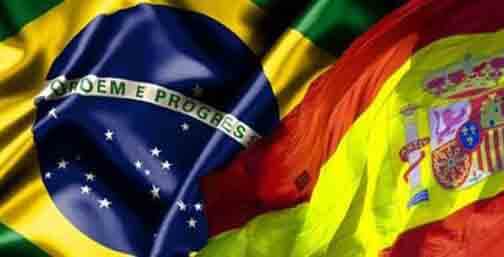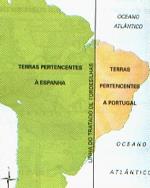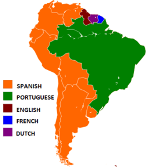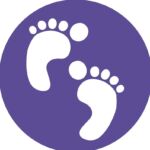Blog
Does Portugal and Brazil speak the same language?
- Wednesday April 21st, 2021
- Posted by: Amanda Ennes
- Category: Learn the Portuguese Language and Portuguese Grammar

Brazilians are the only people in Latin America that speak Portuguese (not Spanish!) as their primary language. That may be the cause of confusion for many people visiting Brazil for the first time. After all, the official language for most neighboring countries such as Argentina, Uruguay, Venezuela, and Peru is Spanish. This often raises questions like “Does Brazil and Portugal speak the same language?” or “Why does Brazil speak Portuguese and not Spanish?” The historical reason behind this is tied to the Treaty of Tordesillas, which divided South America between Spain and Portugal, explaining why Brazil speaks Portuguese instead of Spanish.
Table of Contents
ToggleSo, does Portugal and Brazil speak the same language?
Discovery of Brazil
Going back to the late 15th century, many European navigators explored the Atlantic searching for new lands. Explorers included Christopher Columbus, John Cabot, Ferdinand Magellan, Giovanni da Verrazzano, and Pedro Álvares Cabral.
Soon after Columbus discovered America, Spain rushed to secure sovereignty over it before any other country could do the same. Unfortunately for them, Portugal decided to embark on a journey to America as well.
 In 1494, Spain and Portugal signed the Treaty of Tordesillas, which would divide their claims along a line of demarcation between the two empires. Spain would gain access to all lands west of the line. On the other hand, Portugal was free to conquer everything to the east.
In 1494, Spain and Portugal signed the Treaty of Tordesillas, which would divide their claims along a line of demarcation between the two empires. Spain would gain access to all lands west of the line. On the other hand, Portugal was free to conquer everything to the east.
Needless to say, there was much more land to be explored west of the line. Because of that, Spain was able to colonize most of what we know today as Latin America. And that is why countries such as Argentina, Chile, Panama, and Costa Rica speak Spanish.
Colonization of Brazil
And so, Spain started to colonize everything west of the Treaty of Tordesillas. Meanwhile, Portugal got only a small piece of land off the Atlantic. This amount of land was basically just the coast of Brazil, represented by the southeast and northeast regions of today.
At the beginning of the colonization of Brazil, Portugal’s main interest was the brazilwood, a useful type of tree found here. Watch teacher Lennon’s video on Why Brazil is Called Brazil to learn more about that. However, another product became more and more economically interesting to Portugal: sugarcane.
Quickly, sugarcane became the main crop in Brazil. In the late 16th century, sugarcane was in high demand, and Brazil’s economy relied heavily on it. Because of that, Brazilian plantation owners began migrating inland searching for more fertile land.
Through these expeditions, they discovered a huge amount of gold, especially in Minas Gerais. A gold rush ensued in the country, which led to even further expansion of Brazil. Over the next century, the borders of modern Brazil were drawn and our country was finally shaped like it is today.
Brazilian Portuguese Language
Of course, there were many Indigenous people here before the Portuguese arrived in Brazil. Millions, actually.
 As history unfolded, the European Portuguese language from the colonizers started to adopt bits and pieces of local dialects. Indigenous languages such as Tupi and Guarani had a great influence on the Brazilian Portuguese language of today. Moreover, African slaves brought to Brazil also contributed to the language, bringing their own dialects into our culture.
As history unfolded, the European Portuguese language from the colonizers started to adopt bits and pieces of local dialects. Indigenous languages such as Tupi and Guarani had a great influence on the Brazilian Portuguese language of today. Moreover, African slaves brought to Brazil also contributed to the language, bringing their own dialects into our culture.
Today, Brazilian and European Portuguese have slight differences in vocabulary and grammar, though major differences in pronunciation. Nevertheless, the two languages remain very similar in general. For further reading, check our blog post: European Portuguese vs. Brazilian Portuguese – What are the main differences?
Learn Portuguese
Now that you know a little bit about the origin of the Brazilian Portuguese language, how about exploring it further? At Caminhos Language Centre you not only learn Portuguese but immerse yourself in the Brazilian culture. We offer different courses, among group classes and private lessons, so people choose what is better for their needs. At Caminhos, we offer Portuguese courses on 10 different levels, from beginner to advanced, including a special class for Latin languages-speakers.
Caminhos organizes free activities every day of the week in order to encourage the practice of Portuguese and social gatherings. Furthermore, the school also provides its students with student visa support and accommodation in Rio de Janeiro.
Caminhos Language Centre is the largest and most exciting Portuguese school in Rio de Janeiro, Brazil. We have an excellent infrastructure, over 15 experienced Brazilian teachers, and a friendly multilingual support staff. We are the only school in Brazil able to offer Portuguese group courses throughout the year on 10 different levels. Moreover, our school also offers more than just Portuguese lessons for foreigners, we offer you the complete Rio de Janeiro experience. Every day we organize 100% free and fun activities for you to socialize and practice your Portuguese. We can also help you with a student visa for Brazil and accommodation in Rio de Janeiro. Follow us on Instagram for some Portuguese tips and news.


 Deutsch
Deutsch Français
Français Português
Português Español
Español

Muito boa a informação obrigado
You forget a information: In 1939, the government instructed the army to inspect communities of foreigners, prohibited immigrants from speaking in public languages other than Portuguese, closed cultural centers for foreigners, censored radio programs and newspapers, where they could not speak and write. in other languages, names of shopping centers and factories should be translated into Portuguese, etc.
A língua é a mesma, não são duas línguas semelhantes, mas variantes da mesma língua…
Quanto à era dos Descobrimentos, começou com os portugueses no início do Sec. V e não no final. A descoberta das Américas, sim, essa foi no final do Sec. XV. No entanto, Cristóvão Colombo pediu ao Rei Português para financiar a sua viagem às Índias que lhe foi recusado, tendo tido posteriormente o apoio do Rei espanhol. Descobriu as Américas a pensar que estava a caminho da Índia, já traçada pelos navegadores portugueses. Não está muito bem contada essa História. 😉